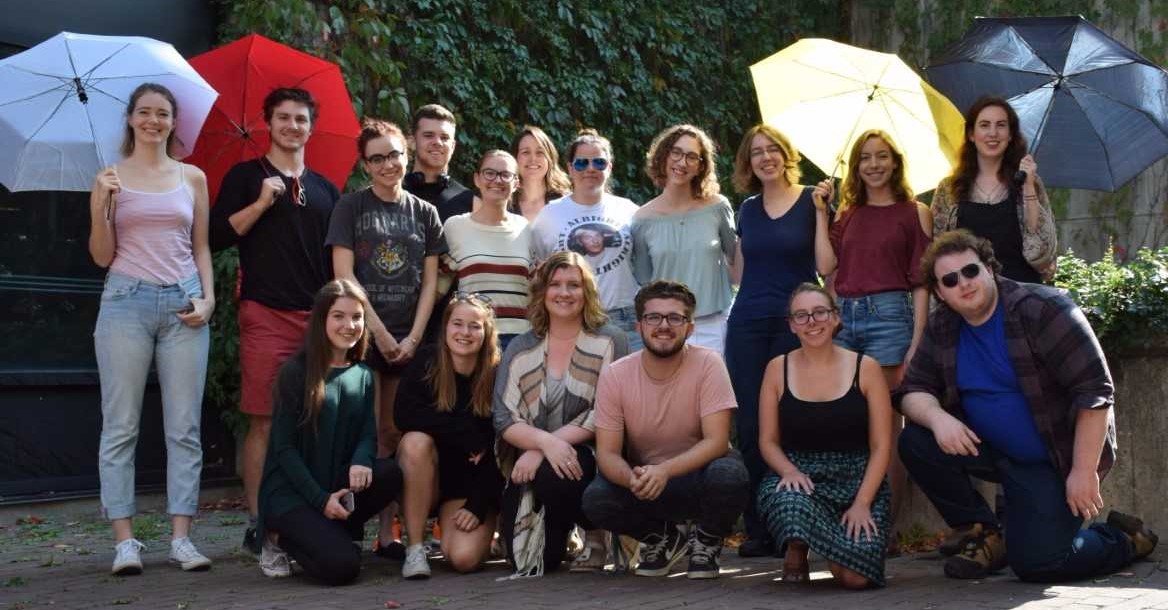
Students in a University of Guelph history class, who say they stand as allies with missing and murdered Indigenous women and girls in Canada, are helping to plan a large-scale awareness-building project on Oct. 19. They want members of the U of G community to participate.
Members of a third-year class taught by history professor Brittany Luby will combine their historical knowledge with social media savvy and organizational and creative skills in the project, called IN UNITY.
“A lot of the intent behind it is raising awareness about the missing and murdered Indigenous women of Canada, as well as showing that we stand against this injustice,” says student Roy Rebelo.
The project’s centrepiece will consist of a human medicine wheel to be assembled on campus, with hundreds of people holding red, yellow, black and white umbrellas. The colours variously represent the four directions in many Indigenous belief systems.
Organizers hope to attract about 600 participants to Alumni Stadium to hold umbrellas for the human medicine wheel. It is possible, says Luby, for up to 1,181 people to stand in the aerial photograph.
“IN UNITY is an opportunity to demonstrate your awareness of #MMIW in Canada,” Luby says. “It is an opportunity to show that you are an ally – it is like saying, ‘I am an active learner. I have heard community concerns. I am still listening for community voices. And, I am willing to stand for change.’”
Officially, 1,181 Indigenous women and girls were reported to, and recorded by, the Royal Canadian Mounted Police as murdered or missing between 1980 and 2012. Many believe the actual number of murdered or missing Indigenous women is much higher, says Luby.
“Taking this class and learning more on this topic has opened my eyes to the fact that missing and murdered Indigenous women and girls is a Canadian issue, not just an Indigenous issue,” says student Emma Stelter. “It has motivated me to literally take a stand against injustice.”
IN UNITY participants will assemble in Alumni Stadium between noon and 2 p.m. on Oct. 19. The human medicine wheel will be photographed from above. A subsequent exhibition will display photographs of up to 1,181 individuals, each showing support for the IN UNITY project. Exhibit details will be announced at a later date.
Student Madeleine McDougall says “shadow figures, like paper women,” will accompany the photographs, as a way to demonstrate that for every missing or murdered person officially recorded, Indigenous community members suggest there may be at least one who is not recorded. IN UNITY will have a broad social media presence on Facebook, Instagram and Twitter. Visit the Eventbrite page to register.
“I’ve always been kind of aware of Indigenous issues, but they have been in the background of my life,” says student Emma Thomas. “This helps bring it to the foreground, and allows me to actually help do something about it, and educate myself.”
The National Inquiry into Missing and Murdered Indigenous Women and Girls, launched a year ago, is holding hearings across the country this fall. The inquiry will examine and report on the causes of all forms of violence against Indigenous women and girls in Canada.
Luby hopes IN UNITY will help make the number of missing and murdered women more tangible for participants, and help inspire others to become allies. Co-organizers of the event are Cara Wehkamp, special adviser to the provost on Aboriginal issues; Prof. Kimberley Anderson, Family Relations and Applied Nutrition; Maria Shallard, Student Life; and photographic consultant Peter Denton.
